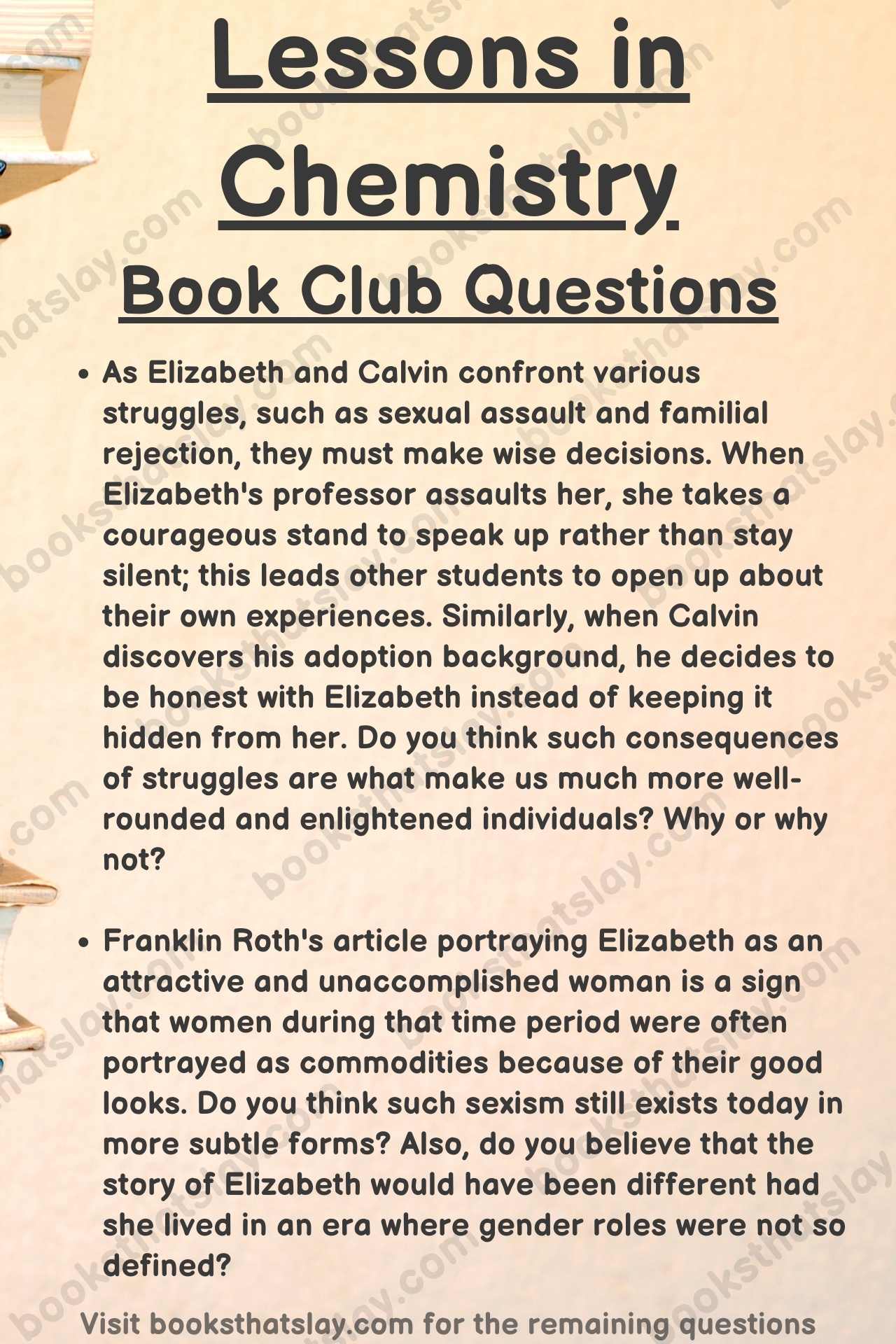12 Lessons in Chemistry Book Club Questions For Discussion
It’s the 1960s.
A world draped in a shiny veneer, yet simmering with social change. Enter Elizabeth Zott, a brilliant chemist blazing a trail through the male-dominated halls of Hastings Research Institute.
Her mind is a crucible of scientific genius, but society sees only a woman in a lab coat.
Then, love throws Elizabeth a curveball.
Suddenly, she’s a single mother navigating the unexpected world of television. But Elizabeth isn’t one to be confined.
On “Supper at Six,” America’s favorite cooking show, she wields a spatula like a scalpel, her scientific explanations transforming the kitchen into a laboratory of culinary revolution.
Join us as we dive deep into these book club questions on Lessons in Chemistry, a book brimming with laughter, insight, and the indomitable spirit of Elizabeth Zott.
Let’s dissect the societal norms of the era and celebrate the audacity of a woman who dared to be different.
Also Read: Lessons in Chemistry Book Review.

Book Club Questions for Lessons in Chemistry
- Calvin and Elizabeth’s relationship evolved from a professional to a romantic one, grounded in their intellectual connection and mutual support. What traits of Calvin stand out to you as qualities that make him an ideal life partner?
- Calvin’s father never writing to him highlights the emotional neglect Calvin faced from his family. Do you think this lack of familial support made it easier for Calvin and Elizabeth to bond? Why or why not?
- Elizabeth and Calvin faced significant struggles, like sexual assault and family rejection. Elizabeth’s courage to speak up about her assault inspired others, and Calvin’s honesty about his adoption showed his integrity. Do you believe that overcoming such struggles makes individuals more well-rounded and enlightened? Why?
- Elizabeth stabbing her advisor with a pencil symbolizes her fight against the abuse and injustice she faced. Was this act necessary for her to reclaim her power, or could she have chosen another way to deal with the situation? Why might she have avoided going to higher authorities or the police?
- After Calvin’s death, Elizabeth’s work and rowing became her solace, leading to her successful in-house consultations. What do you think were the key factors that contributed to Elizabeth’s ability to turn her life around and achieve success despite her loss?
- Donatti deceived a wealthy investor by presenting Elizabeth as a man, “Mr. Zott,” to reallocate funds meant for her research. How would you react upon discovering such a betrayal after putting in significant hard work?
- Harriet Sloane played a supportive role as Elizabeth’s neighbor. Do you think neighbors should strive to be as helpful as Harriet was in Elizabeth’s life? Why or why not?
- Elizabeth and Calvin’s dog, Six-Thirty, has a humorous and unique name. Did you find the name amusing, and do you think it reflects the intelligence of both Elizabeth and Calvin?
- Elizabeth left Hastings after Dr. Boreywitz took credit for her research. How do you think Elizabeth managed to stay level-headed and determined in her pursuit despite facing significant obstacles?
- Elizabeth’s rejection of wardrobe options to appear “sexy” on Walter’s TV show, opting instead to include scientific content, was a bold move. Did this moment feel empowering to you? Why?
- Franklin Roth’s article depicting Elizabeth as merely an attractive woman highlights the sexism of that era. Do you think similar subtle forms of sexism still exist today? Would Elizabeth’s story be different in a time with less defined gender roles?
- The book ends with Elizabeth finding her place. If a sequel to “Lessons in Chemistry” were written, what new challenges and social taboos might Elizabeth face? How do you think Bonnie Garmus would approach these new challenges?
If you liked this set of questions, here are a few other options you can consider.